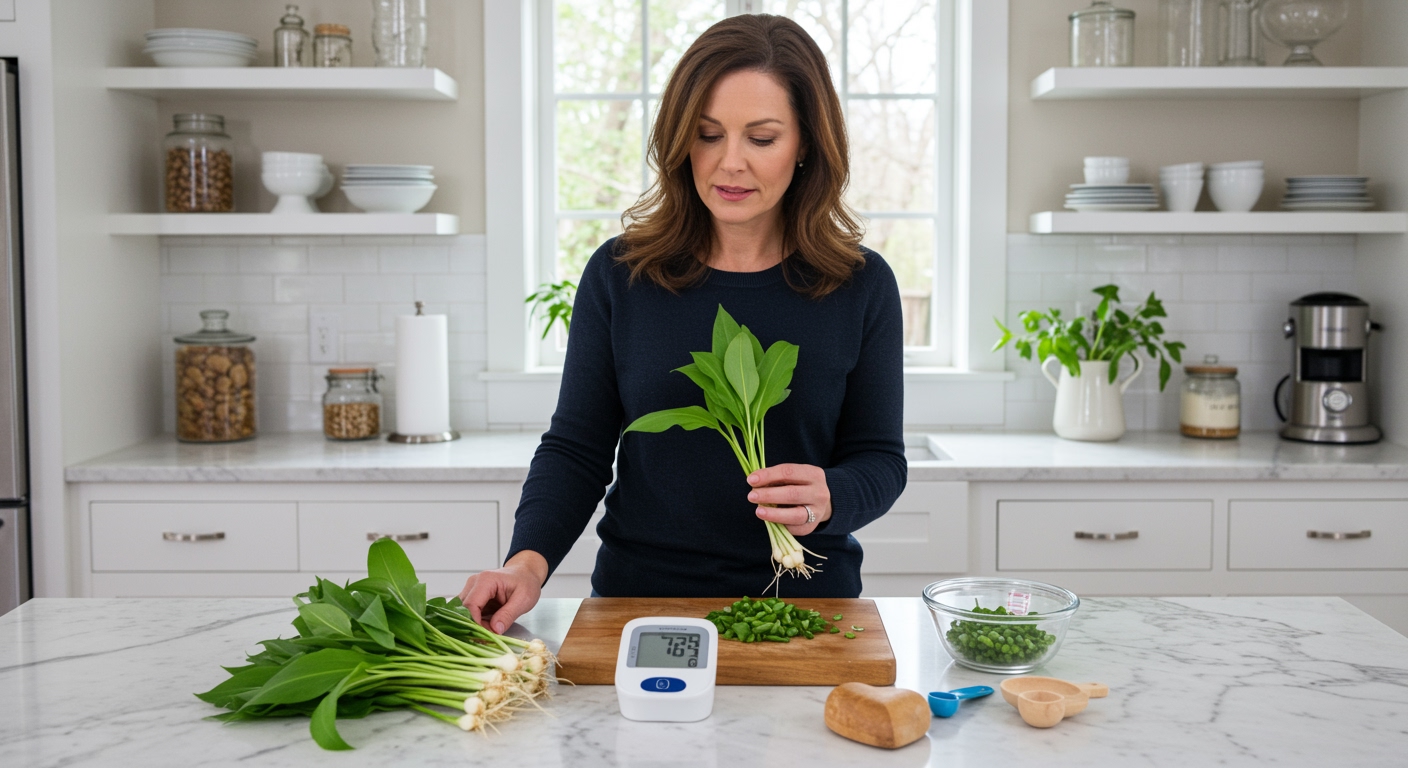✪ Key Takeaway: Ramp bulbs may help lower blood pressure through sulfur compounds and potassium, but evidence remains limited and preliminary.
Introduction
Wild ramps are popping up everywhere from fancy restaurants to farmers markets, but most people have no idea about their potential blood pressure benefits.
You might be wondering about ramp bulbs because you heard someone mention they could help with high blood pressure, or maybe you foraged some and want to know if they offer real health benefits beyond their distinctive flavor.
Hi, I am Abdur, your nutrition coach and today I am going to explain whether eating ramp bulbs can actually lower your blood pressure and what the science tells us about these wild onions.
What Are Ramp Bulbs and How Do They Work?
Ramp bulbs are the underground storage organs of wild leeks that grow in the forests of eastern North America during early spring.
These small, white bulbous roots contain concentrated amounts of sulfur compounds called organosulfides, which give ramps their characteristic pungent smell and taste.
The same sulfur compounds found in ramps are also present in garlic and onions, which have been studied extensively for their cardiovascular benefits.
When you eat ramp bulbs, these organosulfides get broken down in your digestive system and eventually enter your bloodstream where they can affect your blood vessels.
The primary mechanism involves the production of hydrogen sulfide, a gas that helps relax blood vessel walls and potentially reduce the pressure inside your arteries.
Ramp bulbs also contain potassium, a mineral that works directly with sodium to help regulate fluid balance and blood pressure in your body.
✪ Fact: One serving of ramp bulbs contains about 200mg of potassium, roughly 6% of your daily needs.
Do Studies Support Ramp Bulbs for Blood Pressure?
The honest answer is that no specific studies have tested ramp bulbs directly for blood pressure reduction in humans.
However, research on similar plants in the allium family provides some insight into what ramps might be capable of doing.
Studies on garlic, which contains similar sulfur compounds to ramps, show modest blood pressure reductions of about 8-10 mmHg systolic in people with high blood pressure.
The sulfur compounds in allium vegetables work by increasing nitric oxide production in your blood vessels, which causes them to dilate and reduce pressure.
One limitation is that ramp bulbs contain lower concentrations of these active compounds compared to garlic, so the effects would likely be much smaller.
The potassium content in ramps could contribute to blood pressure benefits, but you would need to eat large amounts to get meaningful effects from this mineral alone.
✪ Note: Most blood pressure research focuses on concentrated extracts, not whole foods like fresh ramp bulbs.
How Much Would You Need to Eat?
Based on garlic research, you would probably need to eat several ramp bulbs daily to see any meaningful blood pressure effects.
Most studies showing cardiovascular benefits use the equivalent of 2-4 cloves of garlic per day, which would translate to roughly 6-12 ramp bulbs based on their smaller size.
This amount presents practical challenges because ramps have a very short growing season and are not widely available year-round like garlic.
The strong flavor of ramp bulbs also makes it difficult to consume large quantities without experiencing digestive discomfort or social consequences from the lingering smell.
Additionally, sustainable foraging practices recommend taking no more than one bulb per plant and only from large, established populations to prevent overharvesting.
From a practical standpoint, relying on ramp bulbs as your primary blood pressure management strategy would be both expensive and environmentally problematic.
✪ Pro Tip: Treat ramp bulbs as a flavorful addition to your diet rather than a primary health intervention.
Are There Any Risks or Side Effects?
Ramp bulbs are generally safe for most people when consumed in normal food amounts, but there are some considerations to keep in mind.
The high sulfur content can cause digestive upset including bloating, gas, and stomach discomfort, especially if you eat large quantities or have a sensitive stomach.
People taking blood thinning medications should be cautious because sulfur compounds in allium vegetables can potentially increase bleeding risk when consumed in large amounts.
If you already take blood pressure medications, adding significant amounts of ramp bulbs to your diet could theoretically cause your blood pressure to drop too low.
Some individuals may experience allergic reactions to allium vegetables, which would include ramps and could cause symptoms ranging from mild skin irritation to more serious reactions.
The biggest risk is probably relying on ramp bulbs instead of proven blood pressure treatments like medication, regular exercise, and established dietary approaches.
✪ Note: Always consult your doctor before using any food as medicine, especially if you take prescription medications.
The Bottom Line
Ramp bulbs contain compounds that could theoretically help with blood pressure, but the evidence is weak and the practical benefits are likely minimal for most people.
Real health comes from consistent habits with proven foods, not chasing exotic ingredients with questionable benefits.
I would love to hear your thoughts about ramp bulbs or any questions you might have about natural approaches to blood pressure management, so please share your experiences in the comments below.
References
At NutritionCrown, we use quality and credible sources to ensure our content is accurate and trustworthy. Below are the sources referenced in creating this article:
- PubMed: Garlic and cardiovascular disease
- PMC: Allium vegetables and cardiovascular health
- Penn State University: Researchers study ramps market flavor profile vulnerability pest





